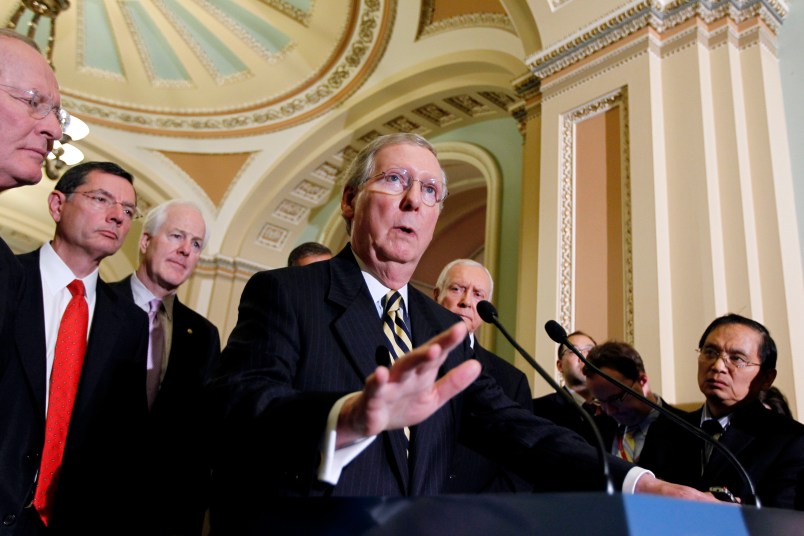Senate Democrats snatched the GOP’s most potent weapon for blocking President Barack Obama’s judges last week when they executed the “nuclear option” and eliminated the 60-vote threshold to advance non-Supreme Court nominees.
But there’s another, more obscure tactic Republicans can use to block Obama’s attempts to fill the dozens of remaining judicial vacancies. It’s called the “blue slip” policy.
The blue slip is an old tradition, dating back to at least 1917, that lets senators have a say on which judges are appointed to courts in their home state. The way it works is that when a judge is nominated, the Judiciary Committee sends a “blue slip” to home state senators seeking their approval. If they sign off, the committee moves forward with the nomination. If one or both of them disapproves or withholds the blue slip, the nomination tends to grind to a halt.
The White House contends that the blue slip policy remains an impediment to appointing judges. Given the Senate’s adherence to the tradition, Obama prefers not to nominate individuals and put them through the tough process unless they’re pre-approved by home state senators. Most of the 42 district and appellate court vacancies without nominees are in states with GOP senators. In Texas, for instance, there are seven judicial vacancies with no nominees.
“The reality is we face is that the blue slip rule can be more problematic than the filibuster, in part because it is a silent, unaccountable veto,” an administration official familiar with Obama’s thinking on judicial nominations told TPM.
The blue slip is not a formal Senate rule and can be ignored. Over time, some committee chairs have adhered to it more closely than others. Senate Judiciary Chairman Patrick Leahy (D-VT) has stood by the practice and said after the filibuster change he will continue to do so.
“I assume no one will abuse the blue slip process like some have abused the use of the filibuster to block judicial nominees on the floor of the Senate,” Leahy said. “As long as the blue slip process is not being abused by home state senators, then I will see no reason to change that tradition.”
It remains to be seen whether Republicans will resort to withholding blue slips more frequently after the filibuster rule change. Some may be tempted to because it’s now their most powerful weapon to thwart Obama from filling up the judiciary with his preferred nominees. If so, it’ll put to the test Democrats’ willingness to uphold the tradition.
“Blue slips are a matter of policy (not a formal committee or chamber rule) set by the chair of the Senate Judiciary Committee,” said Sarah Binder, a professor at George Washington University and congressional expert at the Brookings Institution. “Leahy has followed a common [Judiciary Committee] practice of allowing a single negative (or withheld) blue slip to prevent the committee from holding a nomination hearing. But it’s just a practice (aka norm) of the committee, and Leahy could stop observing it if he so chose.”
Despite progressives’ hopes that the end of judicial filibusters will motivate Obama to pick more liberal judges, the administration official said not to expect his approach to change when deciding who to nominate. As legal analyst Jeffrey Toobin sketched out in his book The Oath, Obama believes social change should come from elected leaders and not judges.
“You have seen, for the past five years now, what the President looks for in a federal judge,” the official said, “and I would not expect this Senate rule change to prompt a radical shift in the types of judges the President nominates.”






